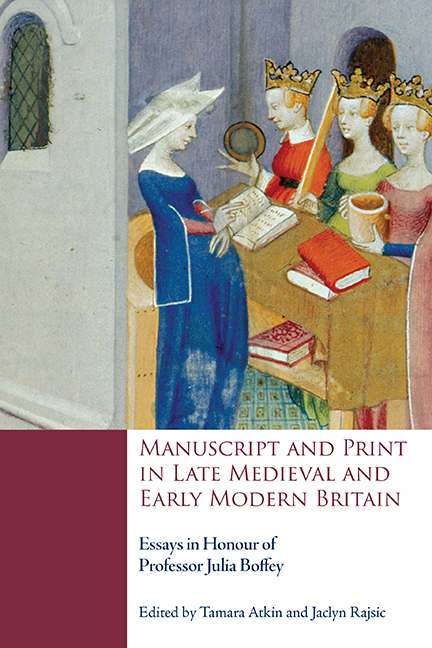 Manuscript and Print in Late Medieval and Early Modern Britain
Manuscript and Print in Late Medieval and Early Modern Britain Book contents
- Frontmatter
- Contents
- List of Illustrations
- List of Contributors
- Acknowledgements
- List of Abbreviations
- Introduction
- PRODUCING TEXTS
- 1 Gower's ‘Epistle to Archbishop Arundel’: The Evidence of Oxford, All Souls College, MS 98
- 2 From Oxford to Eton with Master John Maunshull: Teaching the Tria sunt in Bodleian Library MS Laud misc. 707
- 3 Gavin Douglas, Aesthetic Organization and Individual Distraction
- 4 Gavin Douglas's Eneados: The 1553 Edition and its Early Owners and Readers
- 5 Caxton and the Crown: The Evidence from the Exchequer of Receipt Reconsidered
- 6 Late Medieval Books of Hours and Their Early Tudor Readers In and Around London
- 7 London, British Library, MS Harley 367 and the Antiquarian Ideals of John Stow
- READING INFLUENCE
- Afterword
- Julia Boffey: A Bibliography
- Manuscript Index
- General Index
- Tabula Gratulatoria
2 - From Oxford to Eton with Master John Maunshull: Teaching the Tria sunt in Bodleian Library MS Laud misc. 707
from PRODUCING TEXTS
Published online by Cambridge University Press: 06 September 2019
- Frontmatter
- Contents
- List of Illustrations
- List of Contributors
- Acknowledgements
- List of Abbreviations
- Introduction
- PRODUCING TEXTS
- 1 Gower's ‘Epistle to Archbishop Arundel’: The Evidence of Oxford, All Souls College, MS 98
- 2 From Oxford to Eton with Master John Maunshull: Teaching the Tria sunt in Bodleian Library MS Laud misc. 707
- 3 Gavin Douglas, Aesthetic Organization and Individual Distraction
- 4 Gavin Douglas's Eneados: The 1553 Edition and its Early Owners and Readers
- 5 Caxton and the Crown: The Evidence from the Exchequer of Receipt Reconsidered
- 6 Late Medieval Books of Hours and Their Early Tudor Readers In and Around London
- 7 London, British Library, MS Harley 367 and the Antiquarian Ideals of John Stow
- READING INFLUENCE
- Afterword
- Julia Boffey: A Bibliography
- Manuscript Index
- General Index
- Tabula Gratulatoria
Summary
THE ART OF POETRY AND PROSE that was known by its incipit ‘Tria sunt’ was created in the late fourteenth century, in all likelihood by a Benedictine monk with strong ties to Oxford, probably for use in preparing other monks for their studies at the university. Many of the fifteenth-century manuscripts that preserve all or part of the Tria sunt were owned by monk scholars, but others attest to a broader dissemination of this rhetoric textbook both within and beyond the Oxford schools. Careful study of these manuscripts can help explain why the Tria sunt came to be the most widely used of the rhetorical treatises composed in England from the second half of the fourteenth century through the first few decades of the fifteenth.
Tria sunt survives in sixteen copies, most – if not all – of them produced during the fifteenth century and all but one of them in England. Among the new rhetorical treatises associated with the Oxford renaissance of rhetoric, only the contemporary or slightly earlier art of letter writing, Formula moderni et usitati dictaminis (c.1390), by the Benedictine monk Thomas Merke is nearly so well represented, with eleven surviving copies. In fact, even the most influential and authoritative of the medieval arts of poetry and prose – Geoffrey of Vinsauf's early-thirteenth-century Poetria nova – was at best only slightly more popular in late-medieval English schools than the more recent Tria sunt, if the number of fourteenth- and fifteenth-century English manuscripts that preserve all or part of it is any indication. Twelve complete copies of the Poetria nova survive from this period, along with three imperfect copies and excerpts found in another four manuscripts.
Like the Poetria nova – the work with which it is copied more frequently than any other – the Tria sunt must have derived some of its appeal from the breadth of its contents. It covers, in prose, nearly all the topics that the Poetria nova covers, in hexameter verse, as well as some important topics that the earlier treatise omits or neglects, such as the attributes of persons and actions and the rules for composing letters.
- Type
- Chapter
- Information
- Manuscript and Print in Late Medieval and Early Modern BritainEssays in Honour of Professor Julia Boffey, pp. 35 - 52Publisher: Boydell & BrewerPrint publication year: 2019


